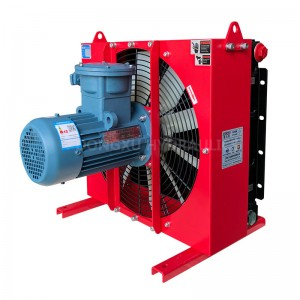Hydraulic oil coolers are commonly used to provide effective cooling in a variety of applications ranging from household appliances to industrial processes. These devices rely on a heat transfer process to remove excess heat from a given space and maintain a comfortable and safe environment. Understanding the heat transfer characteristics of an air cooler can help us better understand its functionality and efficiency.
Heat transfer in hydraulic oil coolers occurs primarily through three mechanisms: conduction, convection, and radiation. Conduction is the transfer of heat through direct contact between two objects. In an air cooler, this happens when warm air comes into contact with the cooler surfaces of the equipment. Heat is then conducted from the warm air to the cooler surface, causing the temperature to drop.
Convection is another important heat transfer mechanism in hydraulic oil coolers. It involves the movement of air to remove heat. In this case, the surrounding hot air is drawn into the air cooler where it passes through a cooling medium, such as a cooling coil or a water-immersed pad. When the air comes into contact with the cold surface of the medium, heat is transferred from the air to the medium. The cooled air is then released back into the environment, effectively lowering the overall temperature.
Although less prominent, radiation is also a factor in heat transfer within hydraulic oil coolers. It occurs through the emission and absorption of electromagnetic waves. In this case, the surfaces within the air cooler emit thermal radiation, which is absorbed by the surrounding air. This absorption causes the temperature to drop.
Combining these three mechanisms, hydraulic oil coolers can effectively cool a space by removing heat and lowering ambient temperatures. The efficiency of an air cooler depends on a variety of factors, such as the design and size of the cooler, the cooling medium used, and the airflow rate. Choosing the right air cooler for your specific needs and requirements is critical to achieving optimal cooling performance.
By utilizing conduction, convection, and radiation, hydraulic oil coolers effectively remove heat from a space and provide cooling. It is important to consider various factors to select the best air cooler for your specific cooling needs, ensuring efficient and reliable cooling performance.
Post time: Oct-17-2023
